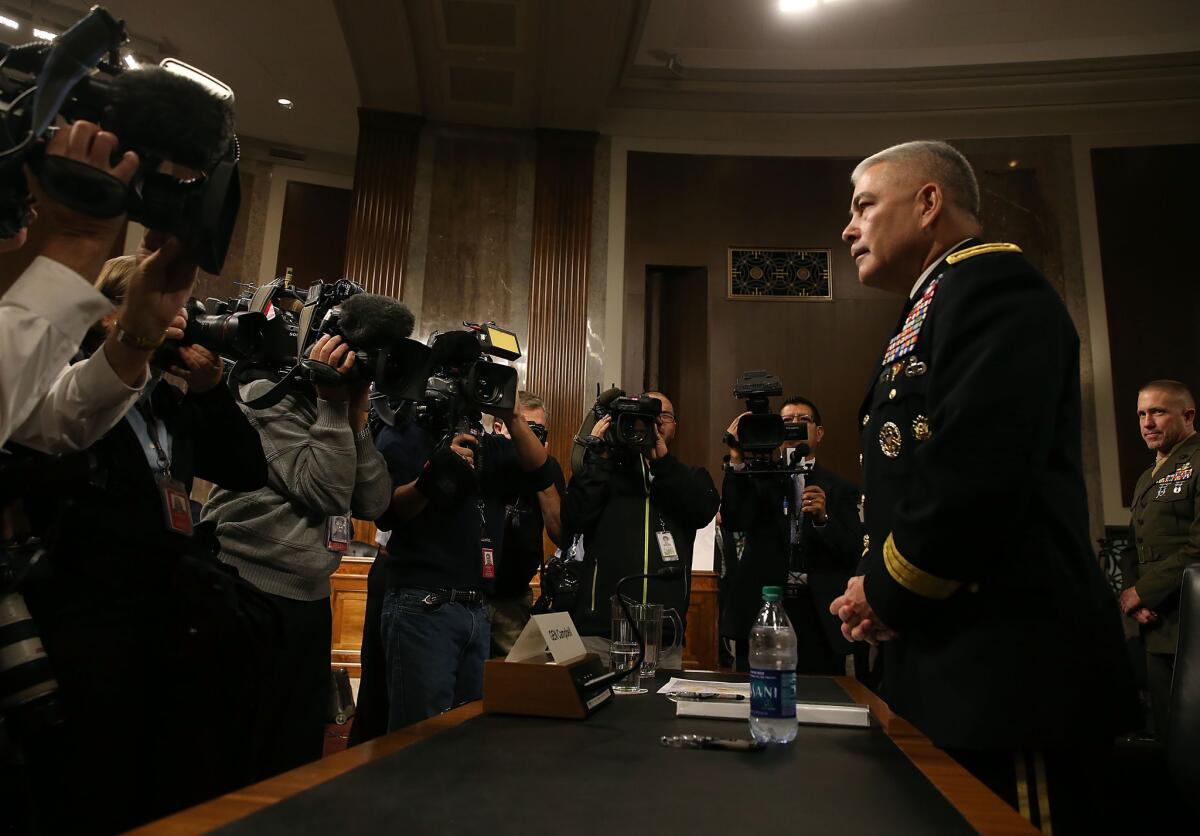Editorial: In Afghan hospital attack, fog of war isn’t a good enough explanation

U.S. Army Gen. John Campbell prepares to testify during a Senate Armed Services Committee hearing on Oct. 6. The committee questioned Campbell on last week’s airstrike on a hospital run by Doctors Without Borders that killed at least 22 people.
- Share via
The U.S. bombing attack on a Doctors Without Borders hospital in Kunduz, Afghanistan, was grotesque, lasting more than half an hour and burning people alive — medical staff and patients alike — in the kind of facility that international rules of war recognize as a safe haven. There should have been no question about the nature of the work done in the building. Doctors Without Borders has operated the hospital for four years. It had reminded the U.S. and Afghan forces just days earlier of the hospital’s location, and it reportedly told U.S. military officials mid-attack that it was under fire from a helicopter gunship. Yet the attack continued, destroying the facility, killing 12 staff members and 10 patients, including three children, and wounding 37 more.
The Pentagon, after some initial confusion about what had occurred, acknowledged that the hospital was mistakenly struck and promised to investigate, which is the appropriate response. Gen. John F. Campbell, who leads the U.S. forces in Afghanistan, reportedly suspects that U.S. troops failed to follow established protocol in approving and conducting the attack. That’s troubling, if true, and the Pentagon should ensure that its investigation proceeds quickly and transparently, with an eye not only toward understanding what happened but also toward drafting procedures to reduce the chances of a repeat episode.
War, it is said, is conducted in a fog, and while civilian deaths are to be avoided and lamented, they are also inevitable. But the incident at the Kunduz hospital was more than a misdirected bomb. It was a sustained attack and, according to Campbell, seems not to have been justified under rules that limit U.S. military engagement to defending American and allied troops, supporting missions targeting Al Qaeda and assisting Afghan forces if they are under attack and at risk of mass casualties. Although Campbell said the Afghan forces requested the air support, the decision to provide it and the approval of the target came from within the U.S. command. He told a Senate committee this week that he has ordered the “entire force to undergo in-depth training in order to review all of our operational authorities and rules of engagement.”
Doctors Without Borders is understandably outraged by the attack, which led it to close its operations in Kunduz, a regrettable loss of medical support in that war-torn city. President Obama on Wednesday offered his apology to Joanne Liu, the head of Doctors Without Borders, but the organization is pressing its allegation that the attack constitutes a war crime and has called for a non-prosecutorial investigation by the International Humanitarian Fact-finding Commission under the Geneva Convention. The medical relief organization is within its rights to seek that independent assessment, and the U.S. government should cooperate.
Follow the Opinion section on Twitter @latimesopinion and Facebook
More to Read
A cure for the common opinion
Get thought-provoking perspectives with our weekly newsletter.
You may occasionally receive promotional content from the Los Angeles Times.








